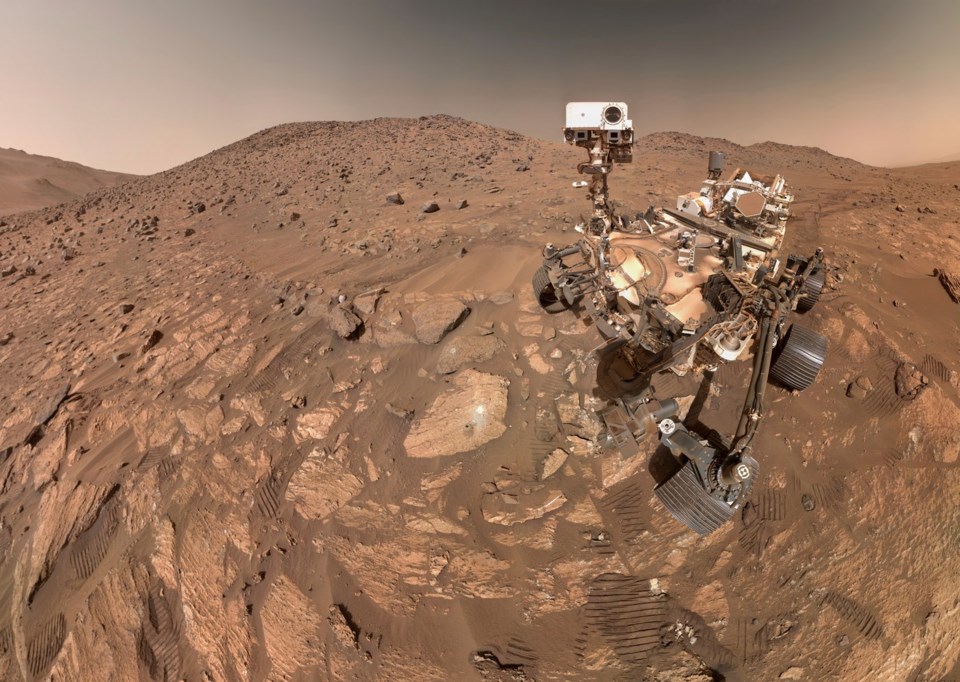Science
NASA’s Perseverance Rover Discovers Potential Signs of Ancient Life

NASA’s Mars rover Perseverance has made significant discoveries that may point to the existence of ancient microscopic life on Mars. This announcement, made on October 25, 2023, reveals that the rover has uncovered intriguing rock formations within a dry river channel, which scientists believe could hold vital clues regarding past biological activity.
The rover’s exploration of the Jezero Crater, an area believed to have once contained water, has yielded samples that show signs of organic molecules. Researchers from NASA have emphasized that while these findings are not definitive proof of life, they serve as compelling evidence that Mars had conditions which could have supported life forms millions of years ago.
Key Discoveries in Jezero Crater
The primary objective of the Perseverance mission is to search for signs of past life and collect samples for future return to Earth. The rover’s analysis focuses on sedimentary rock formations, which are formed by the accumulation of particles over time. These rocks, located in the dry riverbed of Jezero Crater, provide a unique glimpse into the planet’s geological history and its potential to harbor life.
According to scientists, the type of organic molecules found in the sediment could indicate that ancient microbial life once thrived in this region. The presence of these molecules, along with the sedimentary structures, suggests that the area was once more hospitable than it is today.
Future Implications of the Findings
The implications of these discoveries are profound. As NASA continues to analyze the samples collected by Perseverance, the scientific community is eager to learn more about the planet’s past environment. The rover is equipped with advanced instruments designed to detect and analyze organic compounds, which are essential for understanding the potential for life on other planets.
These findings also set the stage for future missions. NASA plans to return samples to Earth as part of its Mars Sample Return mission, allowing scientists to conduct more detailed analyses in laboratories equipped with sophisticated technology.
The ongoing efforts to explore Mars and the findings from Perseverance not only enhance our understanding of the planet but also contribute to the broader search for extraterrestrial life. As exploration continues, the possibility that life may have existed elsewhere in the universe becomes increasingly tangible.
This breakthrough marks a significant milestone in planetary exploration and underscores the importance of continued investment in space research. The results from Perseverance offer a glimpse into the potential for life beyond Earth and the ongoing quest to answer one of humanity’s most profound questions: Are we alone in the universe?
-

 Science2 months ago
Science2 months agoToyoake City Proposes Daily Two-Hour Smartphone Use Limit
-

 Health2 months ago
Health2 months agoB.C. Review Reveals Urgent Need for Rare-Disease Drug Reforms
-

 Top Stories2 months ago
Top Stories2 months agoPedestrian Fatally Injured in Esquimalt Collision on August 14
-

 Technology2 months ago
Technology2 months agoDark Adventure Game “Bye Sweet Carole” Set for October Release
-

 World2 months ago
World2 months agoJimmy Lai’s Defense Challenges Charges Under National Security Law
-

 Technology2 months ago
Technology2 months agoKonami Revives Iconic Metal Gear Solid Delta Ahead of Release
-

 Technology2 months ago
Technology2 months agoSnapmaker U1 Color 3D Printer Redefines Speed and Sustainability
-

 Technology2 months ago
Technology2 months agoAION Folding Knife: Redefining EDC Design with Premium Materials
-

 Technology2 months ago
Technology2 months agoSolve Today’s Wordle Challenge: Hints and Answer for August 19
-

 Business2 months ago
Business2 months agoGordon Murray Automotive Unveils S1 LM and Le Mans GTR at Monterey
-

 Lifestyle2 months ago
Lifestyle2 months agoVictoria’s Pop-Up Shop Shines Light on B.C.’s Wolf Cull
-

 Technology2 months ago
Technology2 months agoApple Expands Self-Service Repair Program to Canada









